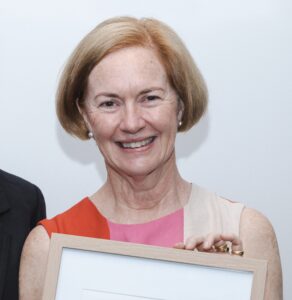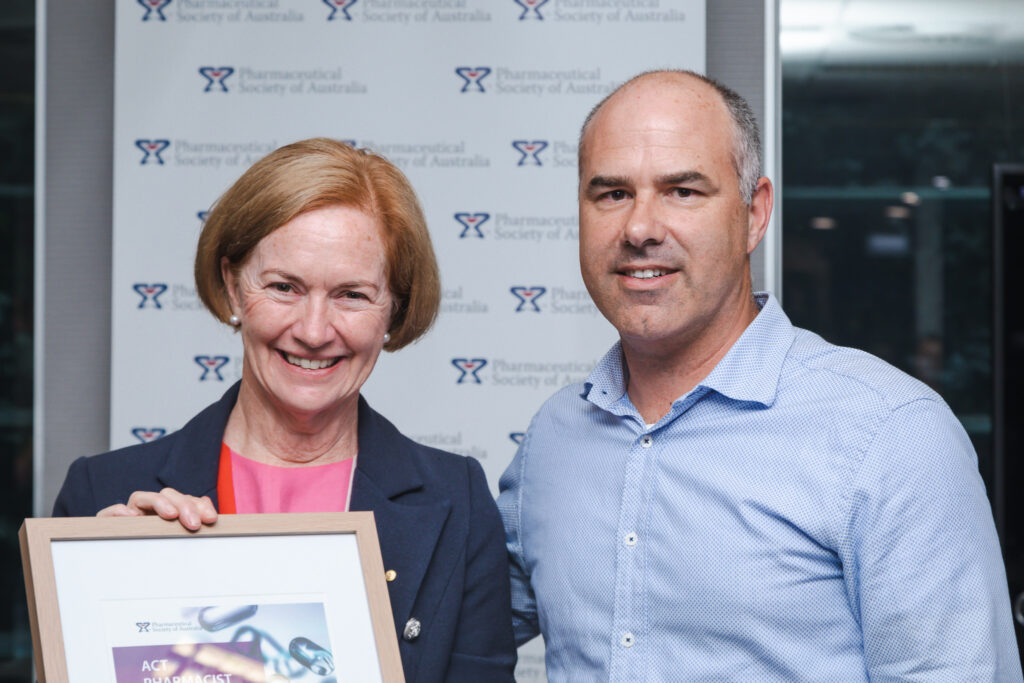WA’s leading pharmacists named in PSA Awards
14 April 2025
The Pharmaceutical Society of Australia (PSA) has presented its 2025 Western Australia Pharmacy Awards, recognising the pharmacists going above and beyond to deliver better care for their communities.
As the peak body for pharmacists, PSA awards pharmacists who make significant contributions to the pharmacy profession through their leadership, commitment to patient care, and excellence in practice.
The pharmacists named in the 2025 West Australian Pharmacy Awards are:
- Ashleigh Chapman MPS as PSA West Australian Pharmacist of the Year
- Rhiannon Price MPS as PSA West Australian Early Career Pharmacist of the Year
- Rachel Lawson MPS as PSA West Australian Intern Pharmacist of the Year
- Emeritus Professor Jeff Hughes FPS as recipient of the PSA West Australian Lifetime Achievement Award.
PSA WA President Kristian Ray MPS congratulated recipients.
“West Australian pharmacists are stepping up across our health system – I’m proud to recognise and celebrate their impact” Mr Ray said.
“Our WA award winners do themselves and their profession proud and are exceptionally worthy recipients. On behalf of the entire PSA community, congratulations to Ash, Rhiannon, Rachel and Jeff.”
About our winners:
Ashleigh Chapman – PSA WA Pharmacist of the Year
Ashleigh Chapman is an outstanding pharmacist whose leadership, innovation, and commitment to patient-centred care have improved medicines stewardship, and equitable access to care in her community. As a non-dispensing General Practice pharmacist at View Street Medical in North Perth, Ash is a driving force in service innovation, improving measurable health outcomes for vulnerable populations and assisting patients in managing chronic disease.
Ash plays an essential role in ensuring medicine safety, conducting comprehensive medication reviews, identifying and managing drug interactions, and leading practice-wide quality improvement initiatives. Her audits on chronic kidney disease and RSV vaccine eligibility have directly contributed to enhanced patient care, with further initiatives planned to support cardiovascular health.
Her leadership in medicines stewardship extends to overseeing practice medication stocktake and ordering, as well as managing long-acting injectable HIV medications at the Cabenuva clinic.
Ash’s coordination of the long-acting injectable HIV medication clinic exemplifies her commitment to equity and access to care. By enabling individuals to receive their treatment in a general practice setting instead of a hospital, she reduces barriers to care and stigma.
This initiative directly contributes to Western Australia’s progress toward the WHO’s “95-95-95” HIV targets. Additionally, her work at Casson House support individuals with complex mental health needs, while her work with gender-affirming healthcare ensures that high-risk patients receive the care they need with dignity and support.
A dedicated mentor, Ash actively shares her expertise with GP registrars, medical students, and nurses. Her presentation at the General Practice Pharmacist Symposium in March further highlights her contributions to the profession.
For her unwavering dedication to improving patient outcomes, advancing pharmacy practice, and fostering workforce development, Ashleigh Chapman is a highly deserving recipient of the PSA WA Pharmacist of the Year award.
Rhiannon Price MPS – PSA WA Early Career Pharmacist of the Year
Rhiannon is an innovative and dedicated pharmacist whose contributions to Aboriginal and Torres Strait Islander care and pharmacy practice are improving patient outcomes. As a General Practice pharmacist at Derbarl Yerrigan Health Service in Maddington, she has led initiatives that enhance health literacy, improve chronic disease management, and advance the role of pharmacists in both primary and aged care settings. Rhiannon also works as a clinical pharmacist at King Edward Memorial Hospital.
A leader in clinical service innovation, Rhiannon has implemented a pharmacist-led spirometry service, supporting early diagnosis and management of respiratory conditions such as asthma and COPD. She has also introduced continuous glucose monitoring, empowering patients to better understand and manage their diabetes while using this as an educational tool to strengthen health literacy. Her ability to foster trust and build strong relationships within the community ensures a culturally safe healthcare environment for First Nations people.
Beyond her clinical work, Rhiannon is shaping the future of pharmacy practice. She was named a 2024 Advancing Practice Pioneer by the Australian Journal of Pharmacy in recognition of her leadership in Aboriginal healthcare. Her work on the aged care on-site pharmacist (ACOP) model, incorporating expert and consumer feedback into a key policy paper, demonstrates her commitment to workforce development and the future of aged care pharmacy. Additionally, she has contributed to PSA’s educational package, supporting pharmacists in delivering high-quality travel health consultations.
Rhiannon’s expertise, compassionate communication, and commitment to culturally responsive care make her a valued member of her healthcare team. Her passion for patient-centred care and ability to drive meaningful change position her as a role model for early career pharmacists. For her leadership, innovation, and dedication to improving health outcomes, Rhiannon is a deserving recipient of the PSA WA Early Career Pharmacist of the Year award.
Rachel Lawson – PSA WA Intern Pharmacist of the Year
Rachel Lawson has demonstrated exceptional dedication to patient-centred care, health promotion, and harm reduction throughout her internship, making a significant impact on both her pharmacy team and the wider community.
Committed to integrating preventative health strategies into pharmacy practice, Rachel played a key role in training colleagues on initiating health-focused conversations with patients. Having worked in multiple pharmacy roles over six years, she fostered a positive and empowering team environment, supporting staff across all levels.
Rachel’s leadership in harm reduction was evident in her advocacy for the Take Home Naloxone program, where she developed consumer-friendly resources and staff training to improve naloxone accessibility, reducing the risk of opioid overdose. She also introduced innovative services, including HIV Self Testing within the pharmacy and a COPD risk screening pilot using the Vitalograph COPD-6 device. Her coordination of bone health clinics further showcased her commitment to preventative healthcare.
Beyond service delivery, Rachel actively engaged with her peers and community. She led a high-impact sleep health presentation for over 150 community members, collaborating with a local researcher to raise awareness of sleep disorders and management options.
Rachel’s proactive mindset, leadership, and commitment to public health make her a highly deserving recipient of the PSA WA Intern Pharmacist of the Year award.
Emeritus Professor Jeff Hughes FPS – PSA WA Lifetime Achievement Award Recipient
Emeritus Professor Jeff Hughes is recognised with the PSA WA Lifetime Achievement Award for his outstanding 45-year career in pharmacy, spanning clinical practice, education, and research, including as PSA’s National Vice-President from 2015 to 2016. His contributions have shaped the profession and left a lasting impact on patient care, pharmacy education, and medication management.
Beginning his career as a hospital pharmacist in 1980, Jeff played a pioneering role in advancing clinical pharmacy practice in Australia. As the leader of Clinical Pharmacy Services at Sir Charles Gairdner Hospital in Nedlands, he was instrumental in integrating pharmacists into patient care teams. He later led the Western Australian Antibiotic Guidelines Review Committee, a critical initiative in improving medicine safety across the state.
Transitioning to academia in 1997, Jeff’s influence expanded as he shaped the education of future pharmacists at Curtin University. His leadership led to the establishment of the Australasian Clinical Pharmacy Education seminars, which have enhanced pharmacists’ skills in medication management. Under his tenure as Head of Curtin’s School of Pharmacy, the school’s research output tripled, and its global ranking significantly improved.
A prolific researcher, Jeff has secured $14 million in research grants and published 176 refereed journal articles on critical issues such as hypertension, diabetes management, and medication transitions. His collaborations with national and international institutions have further strengthened the field of pharmacy research.
He is currently the Chief Scientific Officer of PainChek Ltd which is commercialising AI based pain assessment tools that he co-invented.
Jeff’s legacy is one of excellence, leadership, and dedication to advancing pharmacy practice. His contributions have shaped clinical education, policy, and research, making him a truly deserving recipient of the PSA WA Lifetime Achievement Award.
Photos of the winners are available on request.
Media contact: Georgia Clarke M: 0480 099 798 E: georgia.clarke@psa.org.au




